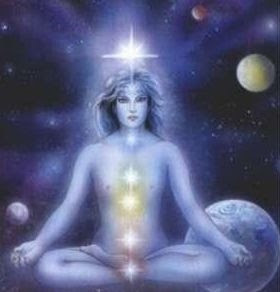I dislike the term ‘mystical experience.’ What happens during true meditation is neither mystical, nor an experience. It’s an event, a phenomenon that is new each time. The brain has the capacity of gathering, through passive observation, an awareness and attention that is quicker than thought. Without effort or will, attention then acts on thought and quiets it. That opens the door. This ‘agnosia’ can happen within anyone, if one understands how to observe thought without division or separation as the observer.
 Effortlessly watching every mental and emotional reaction, without judging or controlling the memories, feelings, and physical states that arise in the moment, is the only action that is needed.
Effortlessly watching every mental and emotional reaction, without judging or controlling the memories, feelings, and physical states that arise in the moment, is the only action that is needed.
In terms of mental activity, there are two levels of reaction. There are spontaneous reactions, such as when part of a conversation one had yesterday replays in the mind. Then there are secondary reactions, such as when we evaluate what we said or did. Meditation occurs when one can observe the first type of reaction without the second.
We experience both types of reactions as arising from the ‘me,’ a seemingly independent entity that forms the center of our existence. But this homunculus in our heads has no more reality than the fully formed human being that was once thought to preexist inside an egg or spermatozoa. In one form or another, ego and survival are still linked at the emotional level in the brain. That’s why it’s so hard for the ego to let go.
However, if awareness is quick and intense enough to see through the illusion and habit of the mind continually dividing itself from itself, the observer/ego dissolves in observation. (I find that asking oneself whether the observer is operating helps draw attention to the mechanism.)
Observing without the observer, the mind naturally and effortlessly grows deeply quiet. The stream of individual and collective content that makes up consciousness (as we usually know it) slows, and stops. At that moment one steps out of the stream.
No longer mediated by words, images, and memories, sensory impressions are heightened, and there is a deepening state of insight. In ending the movement of memory (which is thought) one awakens a meditative state, and the brain is renewed, and remains young throughout life.
In the completely unforced stillness of attention, the brain is aware of energies and actualities that cannot be named. These states have been called, devotionally or derisively, ‘mystical experiences.’ Those words can point to something actual, or refer to nothing but an idea, or to irrelevant knowledge of the saints, or to a self-induced state.
Meditative states are not embedded in religion or tradition, whether of the East or the West. Nor is mystical experiencing personal–the idiosyncratic product of an individual’s consciousness. It is open to anyone who understands the principles of psychological division, undivided observation, and content-consciousness.
A meditative state ignites in undivided observation, and the past ceases, at least temporarily, in the intensity of awareness in the infinite present. Altered states of consciousness and ‘mystical experiences’ are never the goal; there is simply the intent to watch what is, and learn. That intent, plus a quickness and intensity of self-awareness in the shifting currents of consciousness, effortlessly bring about awakened consciousness.
Direct experiencing of the nameless is very difficult to convey of course, since by definition words and knowledge impede the mind’s capacity to contact it. One can only give intimations, and point those who are willing and able to listen toward exploring and awakening their own capacity for awareness of holiness.
Mystical experiencing cannot primarily be contextualized within a given religion, tradition, or culture. Indeed, the essence of it is the ending of the domination of conditioning, culture, tradition, and belief systems, and the opening of the mind and heart to intimations or explosions of sacredness beyond any and all cognitive constructions of the mind.
It’s sad how the knowledge of what has been called mystical experience prevents people from actually experiencing states of insight and grace (to use the Christian word).
And it’s very unintelligent to deride and dismiss Eastern forms of mystical experiencing, since an emphasis on inwardness has been a much stronger in India. That certainly doesn’t mean one has to go to India to awaken deeper states of being.
In fact one of the themes in this column is that anyone can do so anywhere, though a relationship with nature is essential. Having lived in a large city, I’ve found it’s even possible to have a relationship with nature and awaken meditative states in densely populated urban settings.
 Indeed, standing as we are at the spiritual nadir of western civilization, it’s crucial that ordinary people living and working normal lives (if there is such a thing anymore) awaken a true inner life.
Indeed, standing as we are at the spiritual nadir of western civilization, it’s crucial that ordinary people living and working normal lives (if there is such a thing anymore) awaken a true inner life.
Mystical experiencing, stripped of pejorative implications on one hand, and extricated from the encrustations of Catholic theology on the other, is the exception rather than the rule in the Christian tradition. Though there have been genuine Christian mystics such as St. John of the Cross, or St. Teresa of Avila, they were rare, and had to conform to the doctrines of the Church, often on pain of death or excommunication.
The outward orientation of the western mind, which has produced great advances in science and material life, is rooted in an external view of God, separate and above. It holds a spiritually immature notion of a God in heaven that can only be seen after death.
It’s absurd to maintain that the near total spiritual and intellectual enervation of the West can be divorced from the Judeo-Christian theology that underpins western civilization, and has largely brought us to this pitiful pass.
The knowledge of mystical experience, when put first (or even second) prevents it from occurring. Therefore mystical experiencing is the antithesis of orthodoxy, which, by its insistence on tradition, ritual, and the observance of established religious customs, precludes it. To the mediocre, orthodox mind, everything must be placed in their preexisting boxes, to the point that questioning their orthodoxy elicits the label extremist.
The fear and antipathy of the orthodox apologists for the crumbling Catholic Church in particular, and Christianity in general, is palpable. The true response to their dark attacks is pity and compassion, though it seems to require the understanding, forgiveness, and equanimity of Jesus.
The term ‘mystical experience’ has to be changed. Not only is it loaded with all kinds of religious baggage and secular derogatoriness, the phrase implies something supernatural and special. Rather, what’s called mystical experience is the birthright of every human being. It simply means direct experiencing of the wholeness of life, the sublimity of being, and the sacredness beyond thought, knowledge, and the known.
When it occurs, mystical experiencing is always new and always unexpected. Perhaps a better term for it therefore is spiritual agnosia—the temporary loss of the ability to recognize the familiar as familiar (without the connotation of brain damage!), and the opening of the mind, heart, and brain that comes with unmediated perception.
A falcon hovers over the field. Miles away, the dark wall of the canyon stands out in breathtaking relief in the late afternoon sun. The falcon masterfully employs the wind to remain stationary while scanning the ground, and a golden light reflects off its white under-wings.
For nearly a full minute the falcon holds its position. Then, it stops fluttering its wings for a few seconds, and doesn’t move at all. With a grace beyond words, it drops to the ground, its immobile wings pinned back in a perfect ‘V’ as it silently plummets to the earth. It ascends without prey, and I soar away with it.
Martin LeFevre

